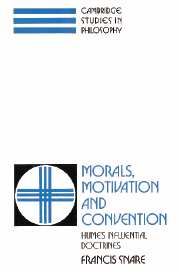Book contents
- Frontmatter
- Contents
- Acknowledgements
- NOTE
- Introduction
- Part I The argument for sentimentalism
- Part II The problems and consequences of sentimentalism
- 6 Continuity and circularity
- 7 The problem with justice
- 8 The conservative theory of justice
- 9 Convention and institutional facts
- 10 Convention and the regard to justice
- Bibliography
- Index
10 - Convention and the regard to justice
Published online by Cambridge University Press: 05 June 2012
- Frontmatter
- Contents
- Acknowledgements
- NOTE
- Introduction
- Part I The argument for sentimentalism
- Part II The problems and consequences of sentimentalism
- 6 Continuity and circularity
- 7 The problem with justice
- 8 The conservative theory of justice
- 9 Convention and institutional facts
- 10 Convention and the regard to justice
- Bibliography
- Index
Summary
Hume requires a theory of convention for two reasons. One is somewhat incidental to his defence of sentimentalism, but is relevant to the broader project of a naturalistic methodological individualism. Hume's approach, in this latter regard, is to explain social institutions (such as legal institutions or the marketplace) and social practices (such as promising or buying) in terms of social norms or rules (i.e., ‘convention’) which, in turn, he wants to explain in terms of acts and properties of individuals themselves plausibly susceptible of a naturalistic account. The second reason Hume needs a theory of convention is in order to give a naturalistic account of the special sort of sentiment which approves of just acts and persons. Hume needs, specifically, an account that can be used non-circularly in a sentimentalist account of our judgments of justice and injustice, i.e., for the judgments which are ‘hard cases’ for his theory.
Many philosophers have been concerned, in the context of philosophy of the social sciences or philosophy of language (that is, rather than in the context of moral philosophy) to propose theories of convention (or rules, or norms) within a general naturalist and methodologically individualist framework (e.g. Grice, 1957; Shwayder, 1965; Lewis, 1969; Blackburn, 1984, ch. 4). However, Hume attempts to produce a satisfactory theory of convention falling under a further constraint beyond what these philosophers require. His theory must also, must most of all, be adequate to meet Hume's second project as well, i.e., to defend his sentimentalism against the charge of circularity.
- Type
- Chapter
- Information
- Morals, Motivation, and ConventionHume's Influential Doctrines, pp. 283 - 309Publisher: Cambridge University PressPrint publication year: 1991
- 1
- Cited by



